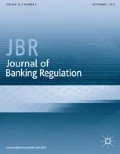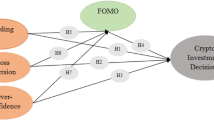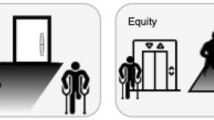Abstract
This study attempts to ascertain the perceptions of Islamic bankers (chief financial officers and risk managers) about the nature of risks, risk measurement and risk management techniques in their banks. It covers 28 Islamic banks in 14 countries using a questionnaire survey. The results indicate that Islamic banks are mostly exposed to similar types of risks to those in conventional banks, but that there are differences in the level of the risks. The findings of the study have both theoretical and policy implications for the issue of transparency, with particular reference to risk reporting in Islamic banks.
Similar content being viewed by others
References and Notes
A contract of sale of specified goods to be manufactured with an obligation on the manufacturer to deliver them on completion. It is a condition in Istisna’a that the seller provides either the raw material or the cost of manufacturing the goods.
A contract for the purchase of a commodity for deferred delivery in exchange for immediate payment.
Bessis, J. (1998) Risk Management in Banking. Chichester: Wiley.
Oldfield, G. and Santamero, A. (1997) Risk management in financial institutions. Sloan Management Review 39 (1): 33–46.
A form of contract in which one party (the rab-al-maal) brings capital and the other (the mudarib) personal effort. The proportionate share in profit is determined by mutual consent, but the loss, if any, is borne by the owner of the capital, unless the loss has been caused by negligence or violation of the terms of the contract by the mudarib. A mudaraba is typically conducted between an Islamic financial institution or fund as mudarib and investment account holders as providers of funds.
An agreement under which the Islamic bank provides funds that are mingled with the funds of the business enterprise and maybe others. All providers of capital are entitled to participate in management but are not necessarily obliged to do so. The profit is distributed among the partners in a pre-determined manner, but the losses, if any, are borne by the partners in proportion to their capital contribution. It is not permitted to stipulate otherwise.
Khan, T and Ahmed, H. (2001) Risk Management: An Analysis of Issues in Islamic Financial Industry. Occasional Paper No. 5, Islamic Research and Training Institute (IRTI), Islamic Development Bank, Jeddah.
Islamic Financial Service Board. (2005) IFSB-1: Guiding Principles of Risk Management for Institutions (other than Insurance Institutions) offering only Islamic Financial Services (IIFS). Kuala Lumpur, Malaysia: Islamic Financial Service Board.
Al-Omar, F. and Abdel-Haq, M. (1996) Islamic Banking: Theory, Practice and Challenges. Karachi, Pakistan: Oxford University Press.
There are now some Shari’a-compliant cash equivalents available, such as Bahraini Salam Sukuk with a 90-day maturity.
A contract of sale with an agreed profit mark-up on the cost. There are two types of murabaha sale in the first type, the Islamic bank purchases the goods and makes them available for sale without any earlier promise from a customer to purchase them and this is termed a normal or spot murabaha; the second type involves a promise from a customer to purchase the item from the bank and this is called murabaha to the purchase order. In this latter case, there is a pre-agreed selling price that includes the pre-agreed profit mark-up. Normally it involves the bank granting the customer a murabaha credit facility with deferred payment terms, but this is not an essential element.
Lease, hire or the transfer of ownership of a service for a specified period for an agreed on lawful consideration. An arrangement under which an Islamic bank leases equipment, a building or other facility to a client for an agreed rental.
Rahn refers to an arrangement whereby a valuable asset is placed as collateral for debt.
In March 1993, Bank Negara Malaysia (the Central Bank of Malaysia) has allowed the conventional banks to offer Islamic banking services using their existing infrastructure and branches to increase the number of players in Islamic banking under a scheme known as Skim Perbankan Tanpa Faedah (Interest-free Banking Scheme).
Al-Sadah, A. K. I. (1999) Regulation of financial reporting by Islamic Banks. Unpublished M Phil Thesis, University of Surrey, Guildford, UK.
Islamic Financial Service Board. (2008) Technical Note on Issues in Strengthening Liquidity Management of Institutions Offering Islamic Financial Services: The Development of Islamic Money Market. Kuala Lumpur, Malaysia: Islamic Financial Service Board.
Accounting and Auditing Organisation for Islamic Financial Institutions. (1999) Statement on the Purpose and Calculation of the Capital Adequacy Ratio for Islamic Banks. Bahrain: AAOIFI.
A contract whereby a buyer of goods makes an immediate down payment of part of the price against future delivery. The buyer has the option to pay the balance, being the purchase price less the down payment, at any time until a specified final purchase date. However, should the buyer choose not to buy the goods by the final purchasing date, the down payment will be forfeited. It is very similar to the call option in conventional finance. The main difference is that a call option is purchased by paying a premium which is not offset against the purchase price should the option be exercised.
A contract in which one or both parties to a contract (or even a third party) holds an option (embedded within the contract) to confirm or rescind the contract within a specified time contingent on the fulfilment of a stipulated condition. The contract has embedded options that could be triggered if the underlying asset's price exceeds certain bounds. The exercise features of this contract are similar to a conventional put option. What differentiates the Khiyar al-Shart option from conventional options is that there can be no separate fee paid at the start of the contract in respect of granting the option right. Therefore, it is the delivery price of the underlying asset, which includes an element that recognises the economic value awarded to the option holder in the contract.
Trema Management Consulting. (2001) Bank risk disclosure survey 2001.
Liljeström, C., Value, M. and Venäläinen, P. (2001) Bank Risk Disclosure Survey. Finland: Trema Management Consulting. The Basel Accord has been introduced by the Basel Committee on Banking Supervision in July 1988. This Accord focuses on the total amount of bank capital, which is vital in reducing the risk of bank insolvency and the potential cost of a bank's failure for depositors. The New Capital Accord (Basel II) intends to improve safety and soundness in the financial system by placing more emphasis on banks’ own internal control and management, the supervisory review process and market discipline, Basel Committee on Banking Supervision (2001), New Basel Accord, Consultative Document, January, Basel, Switzerland.
Usmani, T. (2007) An Introduction to Islamic Finance. Karachi, Pakistani: Quranic Studies Publishers.
Author information
Authors and Affiliations
Corresponding author
Rights and permissions
About this article
Cite this article
Ariffin, N., Archer, S. & Karim, R. Risks in Islamic banks: Evidence from empirical research. J Bank Regul 10, 153–163 (2009). https://doi.org/10.1057/jbr.2008.27
Received:
Revised:
Published:
Issue Date:
DOI: https://doi.org/10.1057/jbr.2008.27




